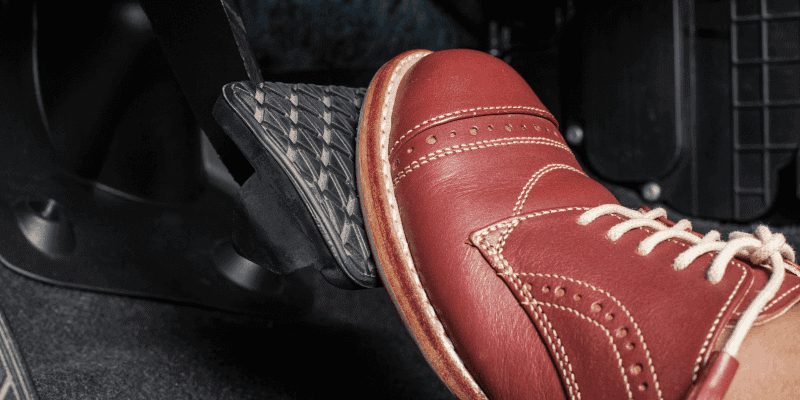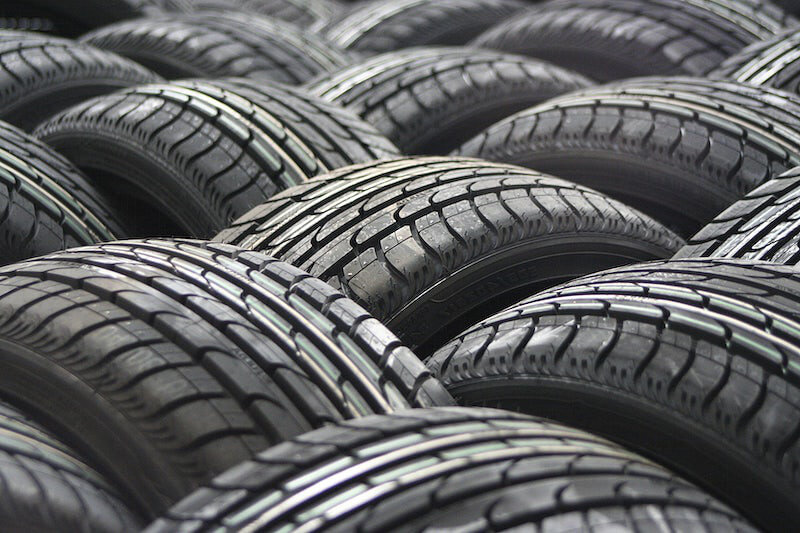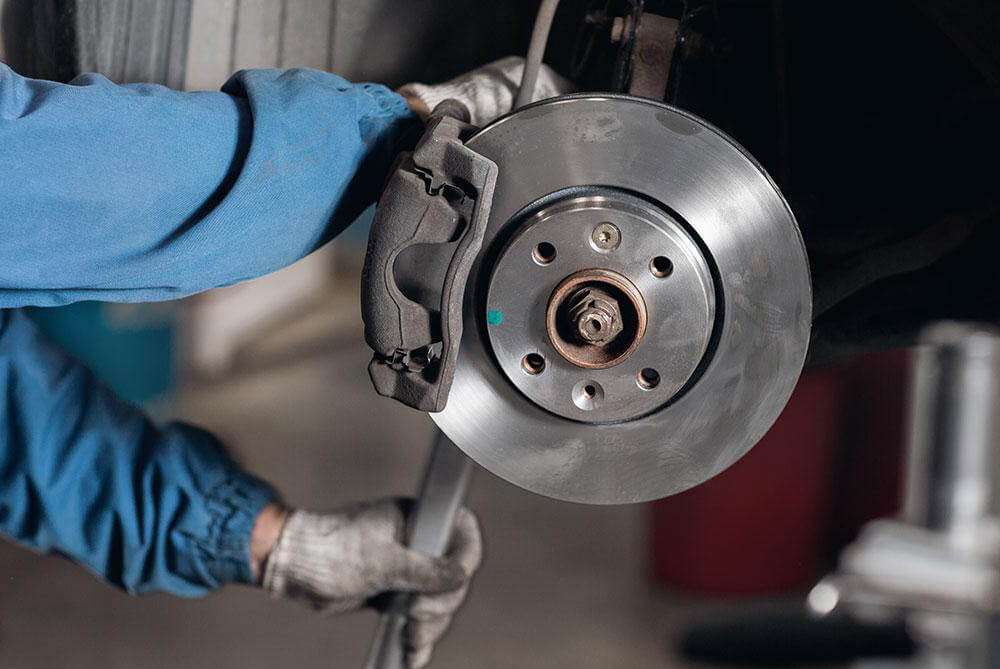The appearance of your vehicle is not affected by the braking system, even though they are among the most essential safety mechanisms. If you took a road trip during December, the brakes on your vehicle were probably put through some strain.
You may be already familiar with a few of the initial warning signs that your brake system requires servicing or just some general maintenance. The following article will explain three indicators and signs that will alert you to the fact that it is time to have your brake system inspected. But before that, let’s take a look at what brakes and brake pads are.
To come to a stop in a controlled manner, the braking system of your vehicle must generate friction. The brake pads are the part of the braking system that is responsible for applying tension to the brake rotor, a process that causes your tires to stop moving when you apply the brakes.
Consider this: how frequently do you hit the brakes when you’re behind the wheel? They are an important requirement, and ensuring that they are properly maintained should be one of your primary concerns whenever you take your vehicle in for its regularly scheduled maintenance.
There Are Three Warning Indications That Your Brakes Need to Be Replaced
When You Come to a Halt, the Vehicle Rattles
This may indicate that there is a problem with the vehicle’s rear brakes. Applying very slight pressure to the emergency brake is the best way to determine whether or not the problem is with the rear brakes. If you notice that your vehicle shakes when you come to a stop, you should have a qualified auto care mechanic examine it as soon as possible to guarantee your safety.
When You Come to a Halt, Your Vehicle Makes a Noise
This is among the telltale signs that your brakes need to be renewed, so you should do so as soon as possible. The part known as a wear indicator, which is connected to the majority of brake pads, is the source of the loud sounds that you are hearing. When the first warning screech goes off, it indicates that you still have some time to get to a service center securely.
Once You Add Pressure to the Brakes, the Steering Wheel of Your Vehicle Shakes
A further classic indication that your brakes require maintenance or need to be replaced entirely is when they start to make grinding noises. If there is a problem with the brake, this sign occurs in virtually all makes and models of automobiles. The front rotors have distorted, which is causing the steering wheel to shake. This is a common sign that your brakes need repairing instead of a complete replacement and can be remedied by having the pads refinished. In some instances, it may reveal that your brakes are leaking. On the other hand, if the issue is triggered by rust, then a complete replacement of the brakes may be necessary.
What Will Happen if You Drive With Worn-out Brakes?
Even though worn brake pads can be quite frustrating, there is a possibility that they will generate adverse effects that are even more serious than drawing everyone’s focus at the roundabout. When you continue driving with worn-out brakes, you increase your risk of having the following four things happen.
The Response Time of Your Brakes May Be Slow

If your brakes are old and worn, it may be more difficult for them to bring your vehicle to a complete stop or even just slow it down. If you suspect that your brakes are getting worn, you must pay more attention to how quickly they respond. This could feel as though you need to apply more pressure to the brake pedal to come to a stop when you are driving with worn brakes that have glazed over.
Driving with glazed brakes can cause additional problems, including increased braking distance, brake slipping, and pulling to one side of the roadway when you apply the brakes. This can happen if the brake pads don’t engage or disengage the rotor as they are supposed to, and if the pads are unable to hold both sides homogeneously, which can cause the vehicle to slide or slip when the brakes are applied.
You Run the Risk of Damaging the Brake Rotors and Calipers if You Do This
If one of the working components in the braking system of your vehicle is damaged, the impairment can spread to other components of the system and cause premature wear. Since the braking system is an interconnected network of mechanical components.
If your brake pads wear away beyond a specific point, for instance, you run the risk of causing damage to the rotors that the brake pads are attached to. When you step on the brakes, the brake pads apply pressure to the rotor, which causes the vehicle to come to a standstill. Every time you apply the brakes, nevertheless, if the brake pads are exceedingly damaged, the metal exposure on the pads will grind against the rotors. This will result in a grinding sound and will probably cause the rotors to become damaged.
Furthermore, the heat that is produced from the metal-on-metal scraping that occurs when damaged pads squeeze the rotor can distort and fracture the rotor. This occurs when the pads are no longer effective in preventing the grinding from occurring. In most cases, the brake rotors will last longer than the brake pads. However, if you don’t get your brake pads changed regularly, you could damage these components, which would then require more regular maintenance.
By changing your brake pads and inspecting your brake system regularly, you can prolong the lifespan of each of its components for a longer period, which will save you money on repairs that could have been avoided.
Your Car Rattles When Braking
When the braking system on your vehicle is in excellent working order, you should experience a smooth shopping experience. Reverberations can be felt throughout your entire vehicle if the brake pads on your wheels have become inordinately worn or if the brake rotors have become damaged. When you step on the brake pedal, if the car rattles or the steering wheel vibrates, and the shaking or vibration stops as soon as you let off the pedal, it’s a promising indicator that it’s time to get your brakes repaired.
It Can Deteriorate Your Tyres in the Long Run

It may be hard to believe, but driving with worn-out brakes can genuinely shorten the life of your tyres as well. If you are driving with brake pads, rotors, or calipers that are worn out, you may find that you have to slam on the brake pedal more frequently to slow down or stop the vehicle.
Because of all of the heavy braking you’ve been doing, your tyres may wear out more quickly or become unbalanced, which will lead to unequal tyre wear. When you take care of your brakes, you should also take care of your tyres!
Simply Don’t Keep Driving With Worn Brakes
Is it safe to operate a vehicle with worn brake pads? In a sense, that is correct. Do you think so? Not, particularly if they have been worn excessively or inconsistently over the years. If you have your brake pads replaced when they wear out and get your brake system properly maintained regularly, you can help prolong the lifespan of the specific elements of your brake system, enhance the safety of your brakes, and even have an overall better driving experience!
Even though a straightforward brake inspection could aid in preventing additional vehicle problems, an estimated 25 percent of motorists are driving on the road with worn-out brakes.

